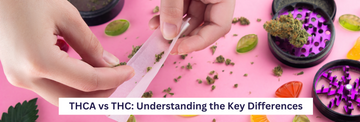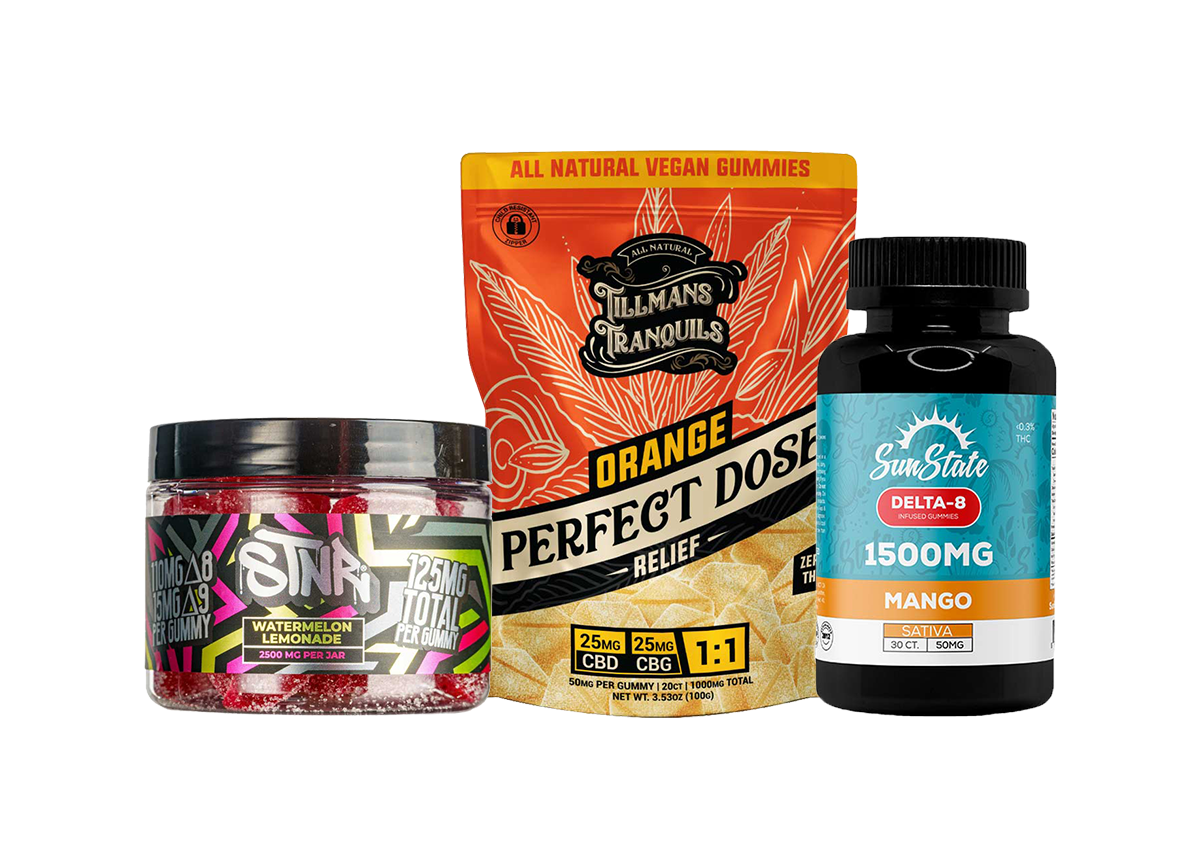When it comes to cannabis, THC and THCA are often mentioned, but what sets them apart? Let's dive into the key differences between THC and THCA to shed some light on their unique properties and effects.
Cannabis, a plant known for its complex chemical makeup, contains more than 100 cannabinoids. Two of these cannabinoids have garnered significant attention: THCA (tetrahydrocannabinol acid) and THC (delta-9-tetrahydrocannabinol). Although similar, THCA and THC have notable variations in their effects, benefits, and legal status.
In this guide, we will explain the basic chemical structure of THCA and how it acts as the non-intoxicating precursor to THC. We will share the therapeutic advantages of THCA and its lack of psychoactive properties, as well as THC, the component in cannabis that produces a psychoactive “high.”
What is THCA?
THCA, or tetrahydrocannabinol acid, is a cannabinoid found in the raw cannabis plant. THCA is structurally similar to THC, but it includes an additional carboxyl group. This group is pivotal because its presence prevents THC-A from binding effectively to CB1 receptors in the brain, which creates psychoactive effects.
Unlike THC, which binds readily to CB1 receptors in the brain and produces psychoactive effects, THCA shows limited binding affinity. Since it does not fit neatly into these receptor sites, you don’t experience the intoxicating ‘high’ associated with THC. This characteristic of THCA makes it a point of interest for those seeking the therapeutic benefits of cannabinoids without psychoactivity.
Before heat or aging initiates a transformation, THCA resides in the trichomes of fresh cannabis plants as a non-psychoactive compound. As such, consuming raw cannabis leaves or flowers won’t have the intoxicating effects many associate with marijuana. Instead, THCA remains in its acid form, offering potential therapeutic benefits without the high.
The conversion of THCA into THC occurs through a process known as decarboxylation. When you apply heat—whether by smoking, vaping, or cooking—you effectively remove the extra carboxyl group from THC-A, turning it into delta-9-tetrahydrocannabinol (THC). This chemical reaction alters the molecular structure and unlocks the compound's psychoactive potential.
The distinction between THC-A vs.THC is crucial for users seeking specific effects from their cannabis experience. While both share similarities in their origin within the cannabis plant, their impacts on the human body are markedly different due to this decarboxylation process.
As research into cannabis and its components continues to develop, THCA has shown promise in various therapeutic applications:
Anti-inflammatory Properties: Several studies suggest that THCA has anti-inflammatory capabilities, which could be beneficial in treating conditions like arthritis or lupus. Its ability to reduce inflammation without the psychoactive side effects offers an advantage for users who need clarity and functionality.
Neuroprotective Properties: Preliminary research indicates that THC-A may have neuroprotective qualities. These findings point towards its potential efficacy in helping prevent neurodegenerative diseases such as Parkinson’s and Alzheimer’s.
Remember: While the lack of intoxication might make THC-A seem like a universally suitable option, individual reactions can vary. It’s essential to consider personal health conditions and consult healthcare professionals when integrating cannabis products into your regimen.
How THCA Transforms Into THC
THC is derived from THCA through a process called decarboxylation.
Decarboxylation removes a carboxyl group (COOH) from a molecule through heat or other means. In the case of cannabis, decarboxylation converts THCA (non-psychoactive) into THC (psychoactive).
When cannabis is smoked or vaporized (methods that involve heat), THCA rapidly decarboxylates into THC. Even when cannabis is stored at room temperature for an extended period, decarboxylation can occur slowly over time.
To put it simply, without THCA, there would be no THC.
THC: The Psychoactive Cannabinoid
When you think of cannabis, the compound that often comes to mind is THC or delta-9-tetrahydrocannabinol. This well-known cannabinoid is the primary psychoactive component in cannabis. Unlike its precursor, THCA, THC has a strong affinity for the CB1 receptors found throughout our bodies, particularly in the brain and central nervous system. When THC binds to these CB1 receptors, it will produce the psychoactive high most people associate with cannabis or marijuana. You may incur feelings of relaxation, euphoria, altered sensory perception, and, in some cases, vivid hallucinations.
Effects of THC
Euphoria: Intense Happiness and Excitement
When THC enters your bloodstream and reaches your brain, it binds to the CB1 receptors, which then releases dopamine - a chemical in the brain associated with pleasure and reward, which causes feelings of joy or euphoria.
Relaxation: Calmness and Peace
Many people who use cannabis say they feel calm and relaxed after consuming products with THC. THC can reduce neural activity, slow down brain function, and create a sense of peace and tranquility.
Altered Perception: Changes in How You Experience Things
Altered perception is a common effect of THC. It can make you perceive time, space, and your body differently. Some people may notice that colors appear brighter, sounds are more distinct, or touch feels more intense.
You should also be aware of the potential side effects of THC.
Heightened Anxiety: Some people may find that high doses of THC make their anxiety worse instead of relieving it. At the same time, others may find that cannabis helps them manage their stress.
Cognitive Impairment: Using large amounts of THC can cause short-term memory problems and difficulty with coordination. It’s essential to be mindful of how much you’re using and how it might affect your ability to think and move.
These risks highlight the need to use THC in moderation. It’s essential to find a balance between enjoying the positive effects while avoiding any potential adverse effects by being informed about what you’re using and paying attention to how it affects you.
Choosing the Right THCA Product
Here are some tips for selecting a THCA/THC cannabis product that suits your needs:
Smoking Pre-Rolls
Onset: Rapid, often within minutes
Duration: Typically 1 to 3 hours
Method: Burning dried raw cannabis flowers and inhaling the smoke delivers THC directly to the bloodstream through the lungs. Smoking is one of the oldest and most traditional ways of consuming raw-form cannabis. The immediate onset is because THC is quickly absorbed into the blood through the lungs when you inhale the smoke. This makes smoking THCA cannabis buds a preferred method for those who want fast relief or immediate effects.
Vaping
Onset: Quick, similar to smoking
Duration: Comparable to smoking, around 1 to 3 hours
Method: Heating cannabis oil or dry herb just enough to turn THC into vapor without burning the plant material. Vaping THCA offers a smoother alternative to smoking. It heats the cannabis product to a temperature that releases THC cannabis molecules in vapor form. This method reduces the inhalation of combustion by-products and can provide a more straightforward flavor profile of the strain used.
THCA and THC Legality: Navigating Legal Restrictions
Navigating the legal landscape of THCA in the USA is complex due to varying state and federal laws. At the federal level, THCA is legal due to the Farm Act Bill. However, marijuana and its psychoactive components, including THC, are classified as Schedule I substances, which are considered illegal. Individual states have enacted their laws regarding cannabis, with many legalizing medical and/or recreational marijuana.
Conclusion
My Pain Center offers a solution for individuals seeking legal access to THCA products. Our commitment to quality ensures that all products undergo purity and potency testing, providing our customers peace of mind. Whether you're seeking relief from pain, inflammation, or other ailments, My Pain Center is dedicated to helping you find the right THCA product for your needs, promoting wellness and vitality legally and responsibly.

